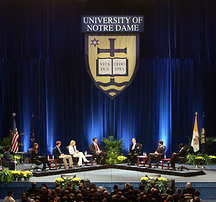
Michael Dewan contracted malaria while serving inUgandathrough a program coordinated by Notre Dames Center for Social Concerns.
Now a senior science preprofessional studies major at Notre Dame, he had been working primarily as a schoolteacher, but then began serving as a laboratory technician at an understaffed clinic in the city ofNjeru. While taking blood samples and testing them for HIV, malaria, hepatitis and tuberculosis, he contracted malaria himself.
For the majority of the people with whom Dewan worked, contracting the disease can be the equivalent of a death sentence. But, Dewan, with the financial resources and medical care that generally is unavailable to a typical Uganadan, was ill for only a week or so.
Perhaps the most maddening aspect of his experience is that the cost of the treatment he received was the equivalent of $8 inU.S.currency.
It was so frustrating that there was so much suffering,Dewan said Thursday (Sept. 14) as a panelist in the second annual Notre Dame Forum.
Dewans story is tangible testimony to the massive inequalities in health care worldwide, the topic of this years forum. TitledThe Global Health Crisis: Forging Solutions, Effecting Change,the event was held in Notre DamesJoyceCenterbefore an estimated audience of 3,600 students, faculty, staff and members of the local community.
PBS senior correspondent Gwen Ifill served as the moderator, and economist Jeffrey Sachs, medical anthropologist Dr. Paul Farmer, and Ugandan physician Dr. Mirian Laker Opwonya were the featured speakers.
Sachs, a professor atColumbiaUniversity, described the hope and frustration in his work as director of the UN Millennium Project. The projects goal is to reduce extreme poverty,disease and hunger by 2015.
We have tools that are incredibly powerful, we just dont use them,said Sachs, author of the best-selling bookThe End of Poverty.
Sachs said that, in his travels to scores of poor villages worldwide, he is always inspired by the people he meets.
With community, there is spirit, hope and a way forward,he said.Ive yet to see a place in the world where the villagers arent fighting for their futures and their childrens futures.
Sachs said that it would cost $1.5 billion – the budget for the U.S. Department of Defense for one day – to cover all of the sleeping sites inAfricawith nets that would protect people from malaria.
The biggest obstacleto solving the problems of poverty and disease, he said,is the sense that many people have that there isnt an answer. Americans dont oppose the idea of helping, and when they learn of the practical solutions, they are ready to act.
Dont ever let anyone tell you,he said,that we cant beat poverty and disease.
Farmer is a professor of medical anthropology atHarvardUniversityand the founding director of Partners in Health, an international nonprofit organization that provides direct health care, research and advocacy on behalf of those who are sick and living in poverty.
Using the example of the struggle against HIV inLesotho, Farmer cited the need for a flexible approach in addressing global health issues.
There has been a long-standing debate about the various alternatives and strategies which are needed,he said.However, it is hard to claim that any one individual intervention is more effective than another. Situations simply change too rapidly.
Farmer cited the effectiveness of funding strategies for global health problems that address multiple social problems, rather than simply a specific disease.
In many cases, a physician would say that the patient has died of consumptive disease,which is simply another way of saying they died from hunger,he said.We needto address multiple social justice issues, not only the particular problem in question.
Opwonya, coordinator of clinical trials for anti-retroviral HIV/AIDS therapy atUgandas Makerere University Infectious Diseases Institute and former coordinator of an HIV/AIDS home-based care program in the city and suburbs ofKampala, addressed the relative effectiveness of condom distribution efforts versus programs aimed at changing behaviors. While acknowledging a degree of success from condom programs, she cited the longer-term benefits of behavior change, especially changes in womens behavior, such as more informed and independent sexual choices and greater resistance to polygamy.
In addition to Dewan, one other Notre Dame student and two graduates of the University participated in the forum.
- Ailis Tweed-Kent, a senior engineering major, told of her work during the summer of 2005 in Mokhotlong,Lesothos, in southernAfrica, ministering to the needs of children, many of them orphans afflicted with HIV/AIDS. Her work was sponsored by The Touching Tiny Lives Foundation, an organization directed in Mokhotlong by 1992 Notre Dame graduate Ken Storen.
- Dr. David Gaus, a 1985 alumnus, spoke of his service as a physician and co-founder of Andean Health&Development Inc., a non-profit agency established to provide a sustainable model of secondary health care delivery. The program addresses the health needs of more than 70,000 residents in the poor, tropical region of ruralEcuador.
- Keri Oxley, who was graduated in 2004, is a third-year medical student atYaleUniversityand a member of Notre Dames Board of Trustees. She told of her experiences working in Mother Teresas Home of the Destitute and Dying in India and the Chapin Street Clinic in South Bend, Ind. She is specializing in international medicine and medical ethics.
As the forum concluded, Notre Dames president, Rev. John I. Jenkins, C.S.C., announced that Raymond Chambers, a University Trustee, had made a gift to theMillennium Project in Notre Dames name.
The Notre Dame Forum was established last year by Father Jenkins to annually assemble world leaders on campus to discuss the leading issues of the day. The forum seeks to engage the entire campus community in these important conversations to better formulate solutions and effect positive change. The 2005 forum addressed the role of religious faith in a plural world.
The theme for this years forum was selected to coincide with Thursdays dedication of Notre Dames new Jordan Hall of Science, a $70 million, 200,000-square-foot building that contains the most advanced scientific and educational teaching instrumentation of any university facility in the nation.
TopicID: 19144